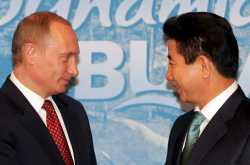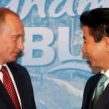
PUTIN’S BUREAUCRATIC RESPONSE TO RUSSIA’S ECONOMIC MISBALANCE
Publication: Eurasia Daily Monitor Volume: 2 Issue: 217
By:

For Russian President Vladimir Putin, the long trip to Busan, South Korea, to the Asia-Pacific Economic Cooperation (APEC) forum summit was quite problem-free, since Russia has no stake in the deadlocked trade disputes that dominated the agenda. The APEC leaders urged Moscow to join the World Trade Organization (WTO) and finalize the negotiations by the ministerial meeting scheduled to open in late December in Hong Kong. According to the head of the Russian negotiation team, Maxim Medvedkov, this goal is entirely feasible (Newsru.com, November 19). The rationale behind it, however, has all but disappeared since Putin officially set it some three years ago when Russia was on the strong growth track – but now the quality of its weakened growth is rather questionable (Politcom.ru, November 18). On the eve of the Busan summit, Putin published an article on his official website (www.kremlin.ru, November 17) and praised Russia’s high-tech potential for Asia-Pacific cooperation, from producing vaccines against the bird flu to monitoring environmental disasters. In reality, however, it is the production and export of hydrocarbons that dominate the domestic markets and will determine the ups and downs of the economy in the near future.
With oil prices being somewhat unpredictable, it would have taken firm leadership and skilled management to keep the largest oil-and-gas producing economy in balance. Russian authorities are clearly overwhelmed by the massive inflow of petro-rubles and seek mainly to “sterilize” most of this volume of money in the Stabilization Fund, which is expected to accumulate $50 billion by the end of this year, and to pay back its external debts (New York Times, November 15). The GDP is expected to grow by some 5.8% in 2005, but the increase in industrial output is twice lower while oil production hardly grows at all. The main cause of this under-performance is the stubbornly low level of domestic investment accompanied by the decline in the flow of foreign investment by some 8% in the first three quarters (Newsru.com, November 18). The Kremlin knows very well how to squeeze and silence big business but cannot force them to invest. “Too much incompetent state and too little economic freedom” – this short definition of the present-day investment climate in Russia was given by presidential adviser Andrei Illarionov, who insists that at least 9% of GDP growth was lost this year as a result of bad economic policy (Rossiiskaya gazeta, September 23).
Sharp growth of state income and a budget surplus generate a parallel growth of expectations in the underprivileged social groups, from pensioners to school teachers to nurses, who demand their fair share of the “oil dividend.” Responding to these demands, Putin announced a series of presidential initiatives or “national projects” aimed at discharging the most explosive social problems. The immediate result of these initiatives was the rise in inflation; the Finance Ministry hopes against hope that it will not exceed last year’s level of 11.5% (the plan was 8%) but the World Bank expects 12% (Newsru.com, November 7). Putin ordered his advisors to develop an anti-inflation program but the recent presentation of the first draft of this document showed that the government was deeply divided between those who favor more savings, like the recently reappointed head of the Central Bank Sergei Ignatyev, and those who advocate more aggressive investment, like German Gref, the minister for economic development and trade (Kommersant, November 17).
Suspecting that his spinned and trumpeted initiatives might be more a part of the problem than a part of the solution, Putin seconded Dmitry Medvedev, the head of presidential administration, to the government, where a new position of first deputy prime minister was specially created. Many Moscow analysts interpreted that promotion as a part of the grooming of a “successor,” predicting that Medvedev would soon replace Prime Minister Mikhail Fradkov and then would automatically become the top candidate in the 2008 presidential race (Vedomosti, November 15). Bureaucratic logic here might appear convincingly straight, but the economic context behind this reshuffling tells a very different story. First of all, Putin’s “national projects” do not really constitute anything resembling a project, since neither the aims nor the means are consistently defined; they are merely declared intentions to pour large amounts of extra-budgetary money into certain areas, like health care, in order to make a tangible difference, like raising salaries (Vedomosti, November 17). Second, Medvedev, with all his talents for court intrigue, has no experience in practical management of large-scale economic programs. Presiding last Friday over the newly created Council on National Projects and sitting in the chair normally occupied by the prime minister, he did not make the best of starts with the promises of “hard work that has nothing to do with political games” but is aimed at “making the life of the people considerably better” (Kommersant, November 19). Finally, it could be very useful for the president to have a top-level official who would carry responsibility if the initiatives would bear much less fruit than loudly promised; scape-goating is as much of a Kremlin tradition as is denial of undeniable blunders.
Curtailing the economic reforms was Putin’s conscious choice, which so far has been validated by the breath-taking run of oil prices. The half-reformed and partly recentralized economy inevitably lost balance as the growing mass of money has accumulated in the energy sector. Petro-economies, however, need fine-tuned strategic management even more than diversified economies, since the proverbial “invisible hand” can suddenly change from unduly generous to mercilessly brutal. In Russia, this kind of management is nowhere in sight; there is not even political competition for the burden of responsibility that is so heavily concentrated in the tiny summit of the vast pyramid of power. Putin has only bureaucratic levers at his disposal that deliver only an illusion of control; that may suffice till the year 2008 but this “mystical” milestone has no significance for the real economy – and sooner rather than later it will make politics return with the vengeance.




